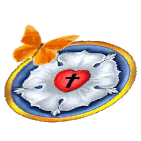|
Preface
Articles 1-4
- God
- Original
Sin
- Son of God
-
Justification
|
|
Articles
5-9
- Ministry in the Church
- New Obedience
- The Church
- What is the Church
- Baptism
|
|
Articles
10-16
- The supper
of the Lord
- Confession
- Repentance
- Use of
Sacraments
- Church
Order
- Church
Rites
- Civic
Affairs
|
|
Articles
17-21
- Return of
Christ
- Free will
- Cause of
Sin
- Faith and
Good Works
- Cult of
saints
- Conclusion
to First part
|
|
Articles
22-24
- Both kinds
in the sacrament
- Marriage
of Priests
- Concerning
the Mass
|
|
Articles
25 -26
- Concerning
Confession
-
Distinction of Foods
|
|
Article
27, 28, conclusion
- Monastic
Vows
- Church
Authority/Power
- Conclusion
|

|
The Augsburg Confession
Article I: Of God.
1] Our Churches, with common consent, do teach that
the decree of the Council of Nicaea concerning the Unity of
the Divine Essence and concerning the Three Persons, is true
and to be believed without any doubting; 2] that is
to say, there is one Divine Essence which is called and
which is God: eternal, without body, without parts, of
infinite power, wisdom, and goodness, the Maker and
Preserver of all things, visible and invisible; and 3]
yet there are three Persons, of the same essence and power,
who also are coeternal, the Father the Son, and the Holy
Ghost. And the term "person" 4] they use as the
Fathers have used it, to signify, not a part or quality in
another, but that which subsists of itself.
5] They condemn all heresies which have sprung up
against this article, as the Manichaeans, who assumed two
principles, one Good and the other Evil: also the
Valentinians, Arians, Eunomians, Mohammedans, and all such.
6] They condemn also the Samosatenes, old and new,
who, contending that there is but one Person, sophistically
and impiously argue that the Word and the Holy Ghost are not
distinct Persons, but that "Word" signifies a spoken word,
and "Spirit" signifies motion created in things.
Article II: Of Original Sin.
1] Also they teach that since the fall of Adam all
men begotten in the natural way are born with sin, that is,
without the fear of God, without trust in God, and with
2] concupiscence; and that this disease, or vice of
origin, is truly sin, even now condemning and bringing
eternal death upon those not born again through Baptism and
the Holy Ghost.
3] They condemn the Pelagians and others who deny
that original depravity is sin, and who, to obscure the
glory of Christ's merit and benefits, argue that man can be
justified before God by his own strength and reason.
Article III: Of the Son of God.
1] Also they teach that the Word, that is, the Son of
God, did assume the human nature in 2] the womb of
the blessed Virgin Mary, so that there are two natures, the
divine and the human, inseparably enjoined in one Person,
one Christ, true God and true man, who was born of the
Virgin Mary, truly suffered, was crucified, dead, and 3]
buried, that He might reconcile the Father unto us, and be a
sacrifice, not only for original guilt, but also for all
actual sins of men.
4] He also descended into hell, and truly rose again
the third day; afterward He ascended into heaven that He
might sit on the right hand of the Father, and forever reign
and have dominion over all creatures, and sanctify 5]
them that believe in Him, by sending the Holy Ghost into
their hearts, to rule, comfort, and quicken them, and to
defend them against the devil and the power of sin.
6] The same Christ shall openly come again to judge
the quick and the dead, etc., according to the Apostles'
Creed.
Article IV: Of Justification.
1] Also they teach that men cannot be justified
before God by their own strength, merits, or works, but are
freely justified for 2] Christ's sake, through faith,
when they believe that they are received into favor, and
that their sins are forgiven for Christ's sake, who, by His
death, has made satisfaction for our sins. 3] This
faith God imputes for righteousness in His sight. Rom. 3 and
4.
|
